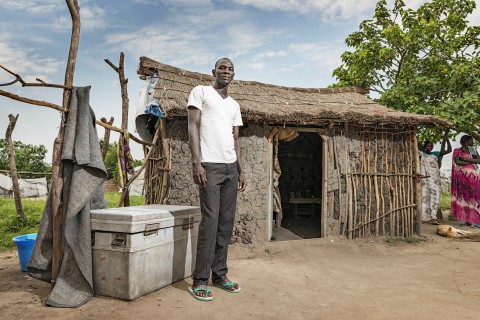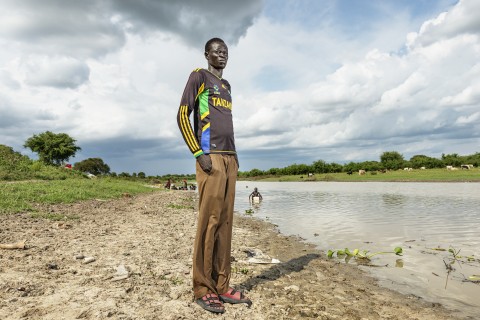Internal violence in tribes: “I want to go fishing without having to be afraid”
Violence between different age groups hangs as a shadow over life in South Sudan. 30-year-old Akim and 26-year-old Korok talk about how their lives are affected By violence.
Text: Satu Helin
Photos: Ville Palonen
The sounds of ringing bells, whistles, shouts and singing interrupt our conversation with peace advisor John Tawan from the South Sudanese government in the town of Pibor.
“Listen, this is what it’s like. Again”, peace advisor Tawan laments.
The town of Pibor, located in the eastern part of South Sudan, lies in the territory of the Murle tribe. A special characteristic of the tribe is that it’s composed of groups where members are of different age: roughly speaking, groupings of under 30, over 30 and over 60-year-old members.
The ruckus is coming from one of the local age groups which is marching through town. The group of a few dozen men could be on its way to battle, steal cattle or simply to have a party.
The Lango group of the youngest members and the Botonya group of somewhat older members have a particularly chilly relationship. Violence is common.
“Traditionally, conflicts have been resolved in wrestling or dancing contests. Now, almost everyone here has a weapon. This has made violence more extreme and dangerous”, Tawan says.
Each month, Doctors Without Borders registers dozens, even hundreds of cases of age based violence. Women from another age group may be raped, and children are abducted. Most commonly confrontations arise from cattle rustling and revenge.
“Age alone doesn’t determine membership in a particular age group but reputation and personal feats are also important factors. Many have been combatants in wars in South Sudan and don’t want to wait for permission to join an elderly and more esteemed age group. This is one thing that is causing tension between the Lango and Botonya groups”, says Marie Makweri, Finn Church Aid Peacebuilding Officer in South Sudan.
Early last December, Finn Church Aid (FCA) launched a pilot project with the goal of building peace between different age groups through vocational education and peace work.
The three-month training gathers 76 men and women from the Botonya and Lango groups to study fishing, cooking, dairy production and bakery.
The vocational education will be accompanied by tools for peace work. Two men explain what it’s like to begin studying with members of another group.
South Sudan, the most fragile state in the world
- South Sudan gained its independence from Sudan in 2011.
- 25–30% of the population are illiterate.
- South Sudan was estimated as the most fragile state in the world in 2015 by the Fragile States Index.
- As a result of incessant conflicts, this state of 11 million people has over 2 million refugees.
- The massive drought in Eastern Africa further aggravates the situation of South Sudan. Many parts of the country are in need of food assistance.
- South Sudan is largely dependent upon foreign assistance. Finn Church Aid is the only Finnish organisation conducting peace work in South Sudan.
“First we drink tea together and the following day we fight”
Akim Awowo, 30 years old,
the Botonya group
“Violence between generations has always taken place here, but now it is different. Women are beaten for no reason. Sometimes they are raped. Even if men are the leaders in our culture, women keep things rolling. Perhaps that is why they are often fought over.
We used to use just sticks as weapons, but now people have firearms. I have never been wounded myself, but I have seen other people get injured.
I don’t mind that there are members of the Lango group in the training. It’s common that we might first drink tea together here in downtown Pibor and then fight the next day. For me it’s ok, for example, if I have to go fishing with someone from the Lango group.
I might not be very proud of being a member of this group. The Lango group seems to treat their women better for example. I hope that in the training we can learn to talk to each other. Now, a conflict might break out from me talking to the wrong person.
Because I am one of the leaders of Botonya, the only way for me to end violence is to get people interested in other things than fighting. If I go to [the capital] Juba, members of my tribe there know I’m a leader and demand that I organise a fight if someone has been offended.
For someone like me, who is from the countryside, it’s not easy to feed my family without work and education. Many people have the exact same problem.
I intend to learn fishing, and then teach those skills to others so they could earn a living. If we don’t have any money we’ll just spend our days in the shade of a tree drinking tea, we’ll talk and our conversations lead us into a bad path and eventually we decide to go fighting.”

Akim Awowo lives with his two wives and 1-year-old daughter. He hopes to earn enough money from fishing to be able to educate his daughter. Awowo himself has only gone to school for one year.
“I want to go fishing without having to be afraid”
Korok James, 26 years old,
The Lango group
“I have six children; four girls and two boys, and a wife. They stayed back in my home village Manyirany when I came here to Pibor to find work. Now I have nothing. I don’t even know where to find food for today.
I think a lot about how to end the violence between Lango and Botonya. Currently we have a situation where someone may kidnap someone else’s child from the street in broad daylight.
This training will allow us, the Lango, to discuss among ourselves about what we can do to achieve peace. I think we are peaceful and don’t cause trouble. Maybe the Botonya start fights more often because they are stronger.
I will study fishing. I already know a little bit about it, because I have been learning from the older fishermen. But I want to learn more.
My dream for the future is to be able to go fishing in peace, without having to worry about a member of some other group coming to bother me. Once I’ve earned enough money from fishing, I’m going to buy sugar and flour and sell those. They fetch a better price here than fish.
In terms of violence and fighting, the biggest problems are in villages in the countryside, such as my home Manyirany. When I go back there after the training, I’m going to tell people what I’ve learned and tell them to stop fighting. I would like to become a peace mediator. But I must do something that earns me money so I can feed my children.”

Korok James hopes to get fishing supplies from the training organised by Finn Church Aid so he can increase his catches after graduating. He is prepared to go fishing with a member of the Botonya group, if necessary.
The story was originally published in Finnish in the 2/2016 issue of Maailman Kuvalehti